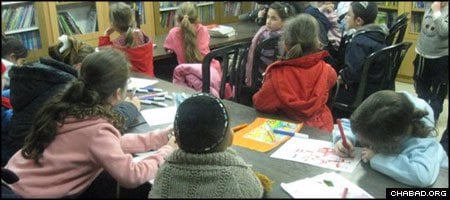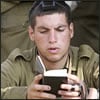Some of the largest rocket barrages of the past week rained down on Israel Wednesday and Thursday as the country continued its offensive against Hamas targets in the Palestinian-controlled Gaza Strip.
With Operation Cast Lead concluding its sixth day of air strikes, Israelis living in an ever-expanding circle of danger tried to maintain some sense of routine between Red Alert sirens that have become all too common. As they’ve done on each day of the latest conflict, Chabad-Lubavitch emissaries and rabbinical students spent their time catering to their home communities and visiting with affected residents; they also provided encouragement to soldiers amassed at the border.
All told, more than 60 rockets fell on Israel on Wednesday, while more than 45 pounded cities like Ashkelon and Sderot throughout Thursday. Three long-range Grad-type rockets hit open areas outside Be’er Sheva overnight, and two short-range Kassam-type rockets struck Netivot. In the morning, six landed in Israel’s Eshkol region.
No Israelis were reported injured on Thursday, but two injured in attacks on Saturday remained at Soroka Medical Center in Be’er Sheva. One man was still in intensive care and a young women was in recovery and facing more surgery after a rocket slammed into Netivot.
Rabbi Menachem Kutner, director of Chabad’s Terror Victims Project, spent the day shuttling between hospitals, checking in on patients and seeing what needed to be done for their families. One of those he visited was Aryeh Deutsch, a resident of Modi’in Illit who was attacked on Sunday by an Israeli Arab employee. The rabbi said that after being struck in the head with a five kilogram sledge hammer, Deutsch remained in intensive care and heavily sedated.
“His life is in grave danger,” said Kutner. “The doctors don’t even want to touch his head until the pressure stabilizes.”
Kutner also oversaw the distribution of some 500 children’s books in Netivot after school administrators called. Because schools have been closed by military authorities, they wanted to encourage children in the area to spend their free time reading.
“Children are sitting at home and it is very boring for them,” said Kutner. “How long can they stay inside?”

Centers Double as Bomb Shelters
In Ashkelon, social workers helped frightened residents stay calm, even as they fought their own concerns.
“Of course they are scared,” said Miriam Cogan, a social worker for geriatric clients. “There is fear, worry and pressure.”
Residents of the coastal city have less than 45 seconds to get to shelter in the event of the air raid siren sounding. Cogan said that her clients know what to do.
In Be’er Sheva, the soup kitchen operated by Colel Chabad – a social service agency founded by the first Chabad Rebbe, Rabbi Schneur Zalman of Liadi – continued to serve warm food to the needy from a space that doubles as a bomb shelter. Many of its clients, some of them new immigrants from Russia who live in temporary housing, chose to remain at the kitchen through the night, sleeping on mattresses provided by city workers.
In the city’s downtown, some 40 elementary school children from the neighborhood spent the day learning in makeshift classrooms at the Chabad Center directed by Rabbi Zalman and Bella Gorelik. Like the soup kitchen, the center is housed in a bomb shelter.
“This is a new reality,” said Zalman Gorelik, who moved to Be’er Sheva during the first Gulf War, when Iraq fired Scud missiles on Israel. “Please G‑d, we will be safe.”









Join the Discussion